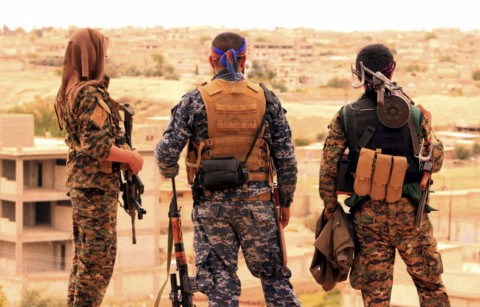
Ankara: US President Donald Trump has approved arming Kurdish forces in Syria in the fight to capture territory from Daesh — a decision made over Turkey’s strong objections.
US military officials contend that Kurdish fighters are needed in the effort to retake Raqqa, the self-declared capital of the Daesh group. But officials in Turkey, a US ally and Nato member, maintain the Kurds are linked to militants in their country that the US and other nations classify as terrorists. The Syrian Democratic Forces, which include the Kurdish fighters, “are the only force on the ground that can successfully seize Raqqa in the near future,” Pentagon spokeswoman Dana White said on Tuesday in an emailed statement. “We want to reassure the people and government of Turkey that the US is committed to preventing additional security risks and protecting our Nato ally.”
The move marks a “new low point” in US-Turkish relations, according to Gonul Tol, director of the Center for Turkish Studies at the Middle East Institute in Washington.
“This is creating a major trust issue between Ankara and Washington,” Tol said in an interview. “I would expect more unilateral action in northern Syria” by Turkey, while furthering empowering Turkish voices “who have been saying the US is not a reliable partner and Turkey should turn to Russia instead.”
Turkey’s lira slumped after reports of the decision, dropping more than 1 per cent. It traded as low as 3.6231, the weakest level since April 24. The latest developments could further weigh on the currency, possibly sending it toward the 50-day moving average near 3.65 per dollar, according to New York-based traders.
The US will provide training to the Kurdish forces and give them the equipment “on a very limited basis” specifically for retaking Raqqa, Defence Department spokesman Eric Pahon said in an interview. That includes small arms such as rifles and ammunition, armoured vehicles, heavy machines guns, and construction equipment such as bulldozers, according to Pahon.
He added that the US is also increasing support to Arab members of the Syrian Democratic Forces.
“We plan to track these weapons and equipment and do our best to get it back afterwards,” Pahon said. Once Raqqa is liberated, “we envision Syrian Arabs governing” the city, he said.
The plan to arm the Kurdish militia, known as the YPG, has been conveyed to Turkey from “multiple levels in the US government,” Pahon said.
The Syrian Kurdish YPG militia on Wednesday promised quick results, and said it would now play a bigger role in the fight against terrorism.
“We believe that from now on and after this historic decision, [the YPG] will play a stronger, more influential and more decisive role in combating terrorism at a fast pace,” spokesman Redur Xelil said in a written statement to Reuters.
Xelil said the decision reflected the confidence generated by the YPG’s battles against “all forms terrorism”, even if the move had come “somewhat late”.
White House press secretary Sean Spicer told reporters he didn’t know if Trump has personally informed Turkish President Recep Tayyip Erdogan of the decision yet. Trump and Erdogan are expected to meet this month ahead of a summit of the North Atlantic Treaty Organisation, the Associated Press reported April 19, citing Turkey’s foreign minister.
Senator John McCain, the Arizona Republican who heads the Senate Armed Services Committee, said he’s concerned about the move.
It’s “understandable but I think it’s fraught with challenges that we are going to have to address,” including how it will be received by the Turkish government, he said in an interview. He said the US depends on Turkey “for a great deal of assistance,” including allowing operations out of the Incirlik airbase.
While Turkey is a member of the US-led coalition fighting Daesh in Iraq and Syria, Erdogan has drawn closer to Russian President Vladimir Putin in recent months. The country, which has Nato’s second-biggest military, has worked with Russia on a plan to establish safe zones in Syria.
Turkey drew rebukes from the State Department and Pentagon last month when its warplanes bombed Kurdish groups in Syria and Iraq, including fighters who are US allies. Those strikes “created further frustration in Washington”, which saw Turkey as slowing down the Raqqa operation, according to Tol of the Middle East Institute.
Officials in Erdogan’s government have called on the US to end support for Syrian Kurdish groups including the YPG, saying it’s an affiliate of the Kurdistan Workers’ Party or PKK, which is considered a terrorist organisation not only by Turkey but also the US and the European Union. The PKK has been battling for autonomy in Turkey’s southeast for more than three decades.
Turkey’s Canikli, in an interview with AHaber television, said the US was giving “all kinds of support” to the PKK through its backing of the YPG in Syria.












